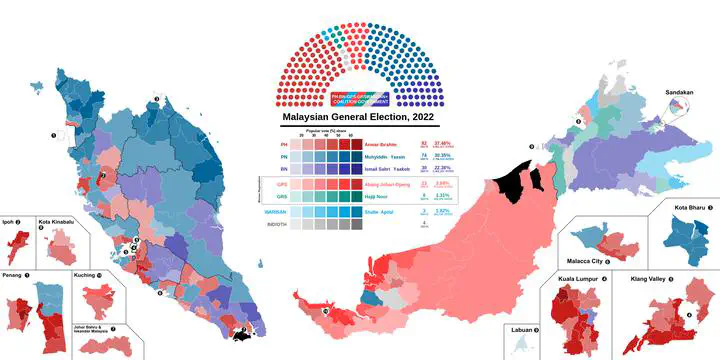Ethnic Politics in Malaysia
 Results of the 2022 Malaysian election.
Results of the 2022 Malaysian election.Building on other work looking at minority politics in the Middle East (here) and India (here and here), I explore majority and minority political behavior in the context of Malaysian elections. Malaysia is a unique context for studying majority and minority politics: Since independence, the majority ethnic group (Malays) have enjoyed political dominance, but due to Malaysia’s British colonial history, they have historically been less well off than some minority groups. Additionally, the Malay identity is defined not only by their ethnicity but also by their religion (Islam), creating multiple dimensions through which their political dominance functions. Lastly, Malaysia is a partly free democracy with a history of ethnic violence in its early years. This experience makes the discussion of ethnicity and religion, especially around election time, a sensitive matter. Thus, the topic of ethnic politics is both salient and important to examine.
In this project, I explore majority and minority politics in Malaysia in two ways. First, I use a survey experiment to manipulate respondents’ exposure to challenges to the political status quo (Malay dominance). Four manipulations vary whether this challenge comes from a majority or a minority member and whether it highlights ethnic or religious dominance. I then explore the effect of these manipulations on voting behavior. Second, I use a conjoint experiment to explore what majority and minority group members view as appropriate discussions of ethnicity and religion by elites during the election season. For instance, do citizens view a minority group politician discussing the discrimination their group faces as appropriate or too sensitive? What about when a majority group member defends the dominant position of Islam as a religion in Malaysian society? The conjoint experiment estimates these effects by varying statements made by elites around election time.
This project is related to a study abroad I helped run in the summer of 2023. My colleague Liz McGuire and I took a group of 21 students on a study abroad to Malaysia. This trip is of personal significance to me because I lived in Singapore and Malaysia during the 2007–2009 period. While living there, I spent much of my time in the more rural areas of East Malaysia, including Kuching and Miri in the state of Sarawak and Tawau in the state of Sabah. However, our study abroad focused on the politics of ethnic Malays in peninsular Malaysia, including trips to the northeastern side of peninsular Malaysia and the states of Kelantan and Terengganu.